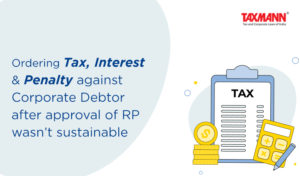Ordering Tax, Interest & Penalty against Corporate Debtor after approval of RP wasn’t sustainable
- Blog|News|Insolvency and Bankruptcy Code|
- 2 Min Read
- By Taxmann
- |
- Last Updated on 2 March, 2023

Case Details: EMC Ltd. v. State of Rajasthan - [2023] 148 taxmann.com 31 (HC- Rajasthan)
Judiciary and Counsel Details
-
- Sandeep Mehta & Rajendra Prakash Soni, JJ.
- Vinay Kothari for the Petitioner.
- Sunil Bhandari for the Respondent.
Facts of the Case
In the instant case, the CIRP was initiated as the petitioner company was sick. The resolution plan was approved by the Adjudicating Authority (NCLT). However, a writ petition was filed against an order from the tax department demanding payment of tax, interest and penalties.
The petitioner argued that the tax department had no jurisdiction to initiate such proceedings in view of the order accepting/approving the resolution plan passed by the NCLT.
The issue raised before the High Court was whether the approved resolution plan u/s 31 of IBC would be binding on all parties including the Government.
Section 31 of IBC read as follows –
If the Adjudicating Authority is satisfied that the resolution plan as approved by the committee of creditors under sub-section (4) of section 30 meets the requirements as referred to in sub-section (2) of section 30, it shall by order approve the resolution plan which shall be binding on the corporate debtor and its employees, members, creditors, [including the Central Government, any State Government or any local authority to whom a debt in respect of the payment of dues arising under any law for the time being in force, such as authorities to whom statutory dues are owed,] guarantors and other stakeholders involved in the resolution plan.
High Court Held
The High Court observed that the tax department had copied and pasted the petitioner’s reply and had failed to consider it properly and to apply mind before passing the said order demanding tax, interest, and penalty.
The High Court held that an order demanding tax, interest and penalty passed after approval of the resolution plan by NCLT was regarded as in violation of section 31 read with section 238 and of judicial precedents. Therefore, the impugned order was declared to be invalid and quashed.
Disclaimer: The content/information published on the website is only for general information of the user and shall not be construed as legal advice. While the Taxmann has exercised reasonable efforts to ensure the veracity of information/content published, Taxmann shall be under no liability in any manner whatsoever for incorrect information, if any.

Taxmann Publications has a dedicated in-house Research & Editorial Team. This team consists of a team of Chartered Accountants, Company Secretaries, and Lawyers. This team works under the guidance and supervision of editor-in-chief Mr Rakesh Bhargava.
The Research and Editorial Team is responsible for developing reliable and accurate content for the readers. The team follows the six-sigma approach to achieve the benchmark of zero error in its publications and research platforms. The team ensures that the following publication guidelines are thoroughly followed while developing the content:
- The statutory material is obtained only from the authorized and reliable sources
- All the latest developments in the judicial and legislative fields are covered
- Prepare the analytical write-ups on current, controversial, and important issues to help the readers to understand the concept and its implications
- Every content published by Taxmann is complete, accurate and lucid
- All evidence-based statements are supported with proper reference to Section, Circular No., Notification No. or citations
- The golden rules of grammar, style and consistency are thoroughly followed
- Font and size that’s easy to read and remain consistent across all imprint and digital publications are applied



 CA | CS | CMA
CA | CS | CMA
